






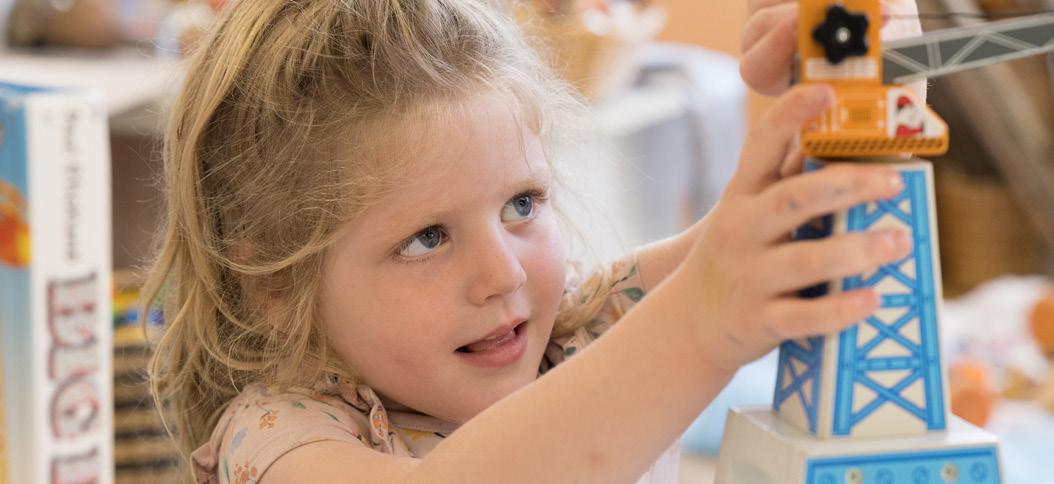
It’s back! Re-introducing your local Brewers Fayre in Scarborough, The Carousel, which has reopened with a brandnew look. Expect all-day dining with a selection of great-value menus, from an unlimited breakfast for £9.99 with two kids dining for free with every adult, to drool-worthy pub classics, a cracking Sunday carvery and plenty to choose from at the bar.
Plus, little mouths can tuck into a three-course meal for only £4.99, which includes at least 2 of their 5 a day when paired with two sides.
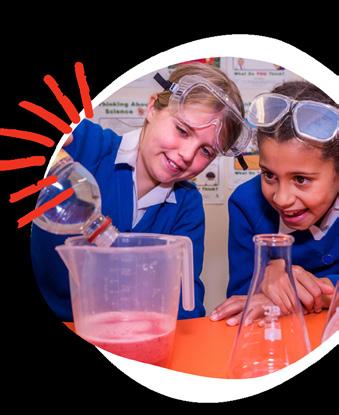

Located a short distance from the beach and the Brunswick Shopping Centre, Brewers Fayre is the perfect spot for a family dinner after a day at the seaside. To book your spot, head to www.brewersfayre.co.uk/en-gb/locations/ yorkshire/the-carousel
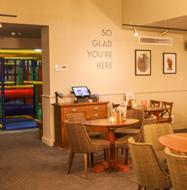

To celebrate the opening, Brewers Fayre has partnered with Families North Yorkshire for the ultimate dinner giveaway.

One lucky winner will receive a £100 voucher to dine with their family at The Carousel, enjoying signature favourite dishes and drinks to make memories with their loved ones. Good luck!
Images for illustrative purposes only. Refurbishment may vary to images used.






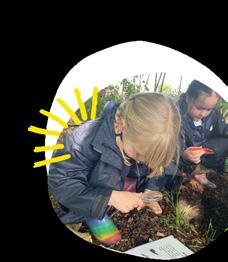

Scan here to enter:
T&C’s apply

The seasons are turning and spring is just around the corner. so it’s time to stop hibernating and re-embrace the big outdoors! Do you remember when you were young, all those blissful and adventure-filled days playing in the local neighbourhood with the other children that lived nearby? We have some interesting information on how you can offer your child the freedom of ‘playing out’ and the benefits this can have on their health.
Check out our interview with CBeebies presenter and BAFTA winner, George Webster. We have 5 signed copies of his new picture book, This is ME! to giveaway, find out more on page 8.
We are pleased to welcome HartLaw LLP to Families North Yorkshire. Dianne and Kate will be talking to us about a different area of family law each issue starting with this issue’s article, The Language of Divorce.
Finally, in this issue, we have Smoby Nature Playhouses to giveaway and you can apply inside. By doing so, you’ll also ensure you receive our digital magazine with lots more content and goodies on offer. Carla
Carla Finlayson, editor
E: editor@familiesnorthyorkshire.co.uk
T: 07734 690020
@FamiliesNYMag
@FamiliesNYMag
@familiesnorthyorkshiremagazine

Education
Celebrity Interview
Outdoors
What’s On Health
Family Law
Parenting Early Years
Families is a registered trademark of LCMB Ltd, Remenham House, Regatta Place, Marlow Road, Bourne End, Bucks SL8 5TD. The contents of this magazine are fully protected by copyright and none of the editorial or photographic matter may be reproduced in any form without prior consent of Families Print Ltd. Every care is taken in the preparation of this magazine but Families Print Ltd, its distributors, franchisees and LCMB Ltd cannot be held responsible for the claims of advertisers nor for the accuracy of the contents, or any consequences thereof.
This product is made of material from well-managed, FSC®certified forests and other controlled sources.
A 2022 global report shows that boys are increasingly becoming left behind in education. Furthermore, recent school entry baseline assessments show over one million boys are already under-achieving by the time they enter Reception. So what are the reasons behind this?
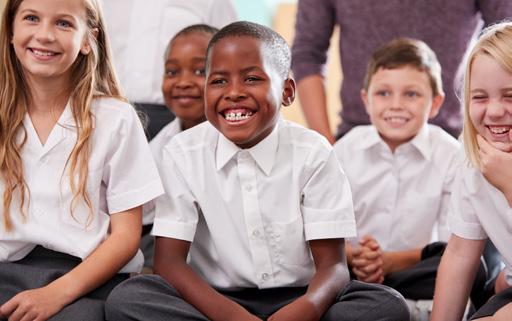
One key factor is that the male brain is wired to respond in external, rather than internal ways. This leaves boys at a disadvantage in the school environment where teaching focusses on the sedentary development of verbal skills, at the expense of active learning. A calm, controlled classroom is usually the teacher’s end goal but boys tend to learn better by doing rather than sitting.
Both at home and at school, boys participate less in activities such as storytelling and nursery rhymes that support language and literacy development. Even playtime choices affect their development; whilst girls often use make believe and role play activities which further develop their language skills, boys generally choose more physical outlets.
The gender gap is further evidenced by the fact that boys make up around eighty per cent of pupils excluded from schools. They are often easily distracted and less likely to follow instructions.
What is being done to address this? Sadly, our education system does not always get it right and only a minority of schools have been successful in developing specific strategies to raise boys’ attainment. These involve refining approaches to learning and teaching by challenging stereotypical perceptions and making necessary changes to the curriculum.
An excellent model which proves the theories about the different learning styles needed for successful boys’ education is the rapid emergence of Forest Schools. Here educators are seeing young boys excel when allowed to learn in the right environment, mixing physicality with academia. The benefits are limitless and encourage children of both sexes to learn in their own ways.
While it may not be possible to find or have access to the perfect school environment, acknowledging that boys will mature later and have different learning needs and styles and giving them the encouragement and support they need, will help them progress through the school system. Encouragingly, once they are mature and by the time they finish school, the gender gap will have decreased with boys often outperforming their female counterparts at A-Level.
Catherine and Lisa are co-founders of Emparenting (www.emparenting.co.uk), supporting children, parents and families with insights, skills and tools to nurture the development and well-being of the next generation.
To the amazing colour festival. To embracing the technicolor chaos. To finishing the day exhausted, on a big comfy sofa in your Exclusive accommodation. Get away to it all, at one of our 21 UK locations.

Imagination is the ability to create mental images, thoughts or ideas. It helps us to generate new ideas, to think creatively and to consider possibilities that may not be rooted in current reality. Imagination can be a powerful tool for problem-solving and innovation.
Imagination is often associated with childhood and is an important aspect of child development. Children use their imaginations to create stories, games and other forms of play in which they explore their environment and learn about the world.


However, imagination isn’t only important in childhood. There are many jobs that rely on imagination and creative thinking. For example, imagination is used by the following professionals in the following ways:
Painters, sculptors, photographers - to create works of art;
Novelists, screenwriters and other writers - to create stories and characters;
Actors - to portray characters and bring stories to life;
Architects - to design buildings and other structures; Graphic designers - to create visual designs for websites, advertisements and other media;
Musicians - to compose music and create new sounds; Game designers - to create interactive games and virtual worlds;
Marketers - to come up with creative marketing campaigns and advertisements;
Teachers - to create engaging lesson plans and activities for their students;
Engineers - to design and build new products and systems.
Imagination takes many forms, including visual imagination to create mental images or pictures, verbal imagination in stories or ideas using words and musical imagination creating melodies and harmonies. It can also involve the use of all five senses, such as when someone imagines the taste, smell, or texture of a food they have never experienced.
By providing opportunities for children to use their imagination and encouraging them to be creative, parents can develop their creative thinking skills.
All imaginative play starts with an understanding of the world around us, so to help a child to use their imagination we must first introduce them to different experiences, from sensory experiences such as discovering new foods or smells, to listening to different accents and instruments. This exposure to the world allows your child to have a large mental ‘dressing up box’ to use when creating characters and scenarios for their imaginative play.
Jemma Zoe Smith is Director of The Education Hotel (www.educationhotel.co.uk).
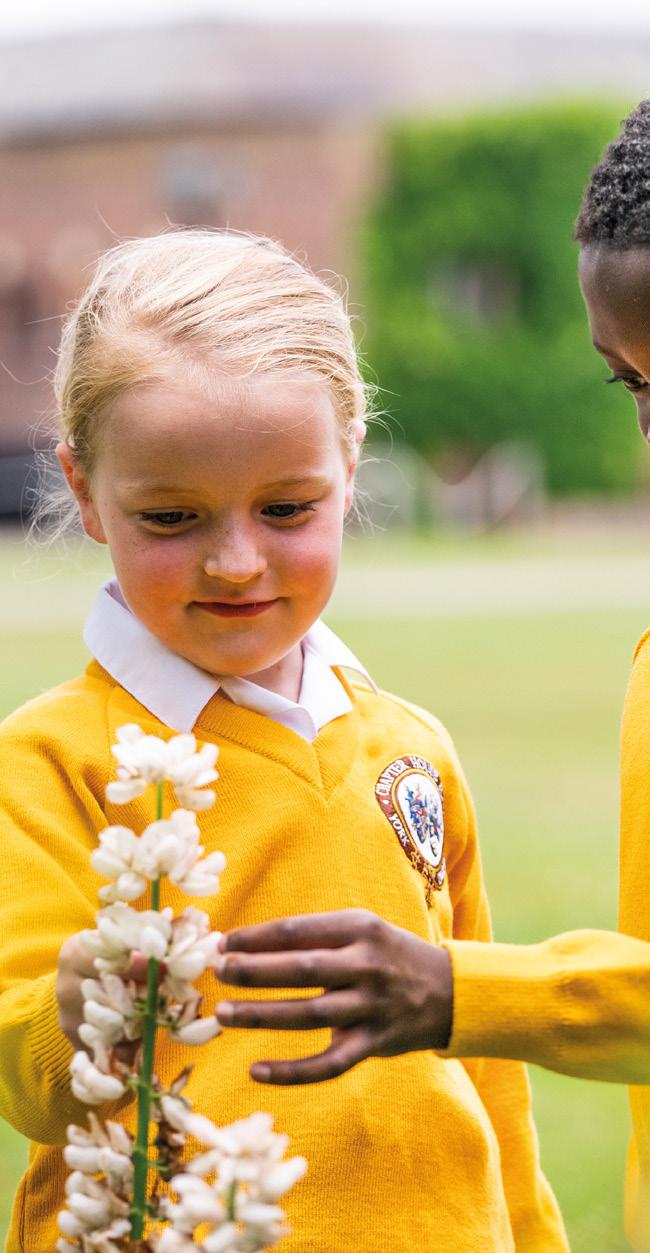

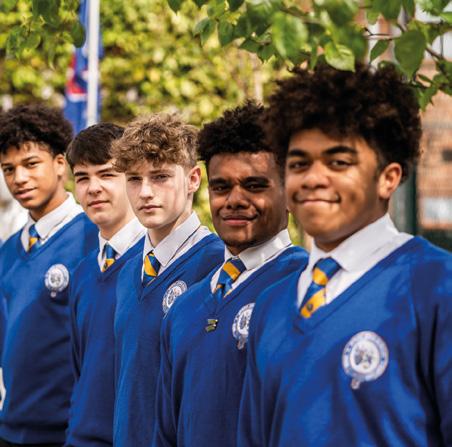
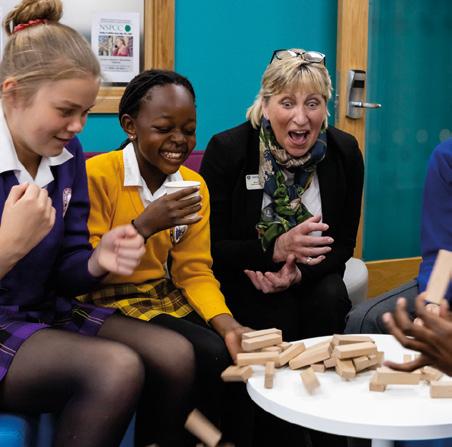

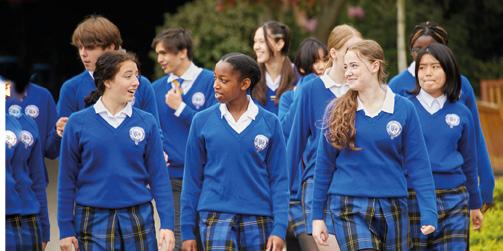
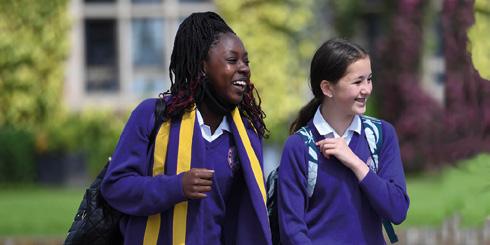
Given eleven years of compulsory full-time schooling, it’s not surprising many children come across difficulties that affect their performance and ability to learn and some switch off learning altogether. The reasons for ‘switching off’ can be many and varied. Here are six of the most common I have come across along with steps which can help children re-engage.
Boredom
It is not uncommon for parents to know intuitively that their child could do much better if they applied themselves. Children need three things to help them do this: to understand how schoolwork helps them develop skills, to know which goal to aim for next and to receive positive praise for small as well as big achievements.
Summer born
Summer born babies are the youngest in their class, which can mean up to eleven months’ less experience of life and development. Being in a group of children who are physically bigger and who know and can do more, can affect confidence and self-belief. Talking to your child about the age difference and what it means can help to keep them engaged.
Learning differences
Sometimes children switch off because they have an undiagnosed learning difference. They get by using coping strategies such as copying friends or telling you they ‘read better in their head,’ to hide their embarrassment. Trust your gut instinct if something doesn’t feel right.

Major events
Separation and divorce, bereavement, moving house, illness and the birth of a sibling all disrupt daily life. It takes three years to recover from a major stress event and we can sometimes forget this in the hurly burly. Having a chat to help settle your child’s mind about the event or remind them how much they’ve achieved or changed can help to ‘update’ their brain and refocus on moving forward.
A normally enthusiastic 7-year-old child had become reluctant to go to school and his work was starting to suffer. His teacher and parent both noticed the change. When investigated, it turned out that the boy’s desk had been moved next to the window in class
and he was cold! He didn’t know who to tell. Sometimes the most challenging issues have the simplest solutions. Ask your child what’s going on in school. Don’t overthink it; start simple.
Poor concentration
The possibilities for distraction from learning are numerous. Too much screen time can agitate young developing brains; not enough sleep; not understanding or liking a subject; being too hot, too cold, too hungry or chatting with a friend and missing instructions can all lead to concentration issues. It is more important than ever that your child can focus and concentrate well in the classroom.
How to help
Sit down with your child and ask them what they see as their strengths and what they are proud of, then tell them what you see they have achieved in the last year. Ask them what help they would wish for at school if you had a magic wand. By taking an interest and showing you care, this helps get the discussion started to tease out anything on their mind that you can help with.
Gail Hugman is the bestselling author of 100 Things to Learn Before You’re 10. A children’s life coach, she owns and runs Human at Core (www.humanatcore.com), which helps parents motivate and engage their children through science-based, online personal development courses.
RHS Harlow Carr is a stunning spot combining garden inspiration with outdoor exploration, all on the doorstep of the historic town of Harrogate. Stroll around the Queen Mother’s Lake and along the UK’s longest Streamside garden adorned with giant candelabra primulas and Mecanopsis poppies. Don’t miss the Alpine House, home to over 2,000 plants, or the tranquil Sandstone Rock Garden. The exotic Sub Tropicana Garden will transport you from Yorkshire to the Tropics, while adventurous younger family members will be wowed by the garden’s stunning stretch of Woodland.
Get away to brighter days this Spring with Away Resorts. Whether you desire coastal or country, our 23 stunning UK locations are jam-packed with fantastic facilities, from arcades to swimming pools, and surrounded by awesome local attractions for full on family fun. Join us at selected parks this Easter for themed activities, stage shows and live acts to keep you and the little ones grinning from ear to ear! So, are you ready to get away to it all with the family (and pooch!) where new experiences await at every turn? Book today at awayresorts.co.uk or call 03333 634189.
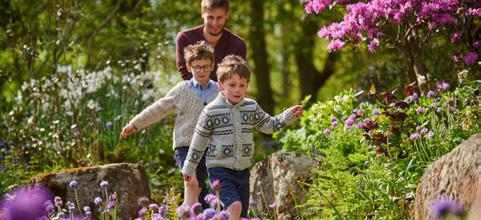

Families chats with George Webster, the 22-year-old TV presenter, actor, dancer and ambassador for Mencap. George was catapulted into the public eye when he spoke about Down syndrome in his myth-busting video for BBC Bitesize. A trailblazer, he is now the first ever CBeebies presenter to have Down Syndrome. In November 2022, George won a BAFTA (Children and Young People Awards) for Best Presenter.
Congratulations on winning your BAFTA! How do you feel about that achievement?
I feel really proud and really honoured to achieve the award for presenter. I work with so many brilliant people at CBeebies and I feel like things are starting to improve for people like me in the media industry.
Tell us about your journey to become a presenter on CBeebies.
I always loved acting, dancing and performing at school and since then one thing has led to another. While volunteering at Parkrun, Sky filmed me for a documentary and I then became a Mencap ambassador. When my BBC Bitesize video busting the five myths of Down syndrome got five million hits, CBeebies got in touch inviting me to be a
guest presenter and now I’m a regular!
Who has been most supportive in helping you achieve your success?
My parents have been really supportive throughout my life and they always keep telling me ‘just be yourself.’ I always am and I want to say thank you to them for their love and support. Also, my support teachers at school, my friends, the NHS and local charities.
What advice would you give to encourage other youngsters who are facing challenges and want to pursue similar careers?
Be yourself and dream big. We can all dream big so don’t let anyone else decide for you as it’s your life. Get involved with local performing arts groups too.

Families has teamed up with BAFTA award-winning TV presenter, George Webster, CBeebies’ first presenter with Down syndrome, to o er five lucky children copies of George’s new book, This is ME!


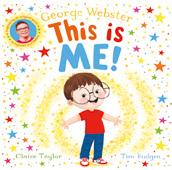


This is ME! is a heartfelt and uplifting story that follows a little boy called George as he tells the reader all about who he is, his life and his experiences. George knows that having Down syndrome is an important part of him but it does not define him.
Featuring George’s real-life friends and family as well as a joyful cast of characters reflective of society and with bright and bold illustrations by best-selling illustrator, Tim Budgen, This is ME! celebrates uniqueness, being ourselves and how our di erences make us special.
Scan the QR code to apply or visit familiesmag.co.uk/go

Closing date: 21 April
T&Cs at https://bit.ly/gwbookgiveaway
What do you enjoy most about presenting?
I love everything about presenting at CBeebies! I’ve met loads of brilliant people and now we’re great friends. I also enjoy showing the viewers at home that people like me can be represented within the media and that ‘difference’ can inspire their kids’ lives. Their kids can have many role models, no matter who and what they are.
You’ve now written a picture book called This is ME! Tell us more.


This is ME! is about me, my friends and family when I was younger. It’s about celebrating differences no matter what we look like and who we are. It’s also about each person having their own glow inside that we all need to see.
The book illustrations are the perfect accompaniment to your rhyming words. How did the partnership come together?
My publisher, Scholastic Children’s Books, paired me with the wonderful illustrator, Tim Budgen. Working with him and my co-author, Claire Taylor, has been brilliant and a real collaborative effort.
What has been the best moment of your career so far?
There are so many! Working with CBeebies, writing a book, winning a BAFTA, being on Casualty, going to the premiere of S.A.M and dancing on stage with Talent Hub. Plus going to UDance National Finals to represent

Yorkshire as the first inclusive dance group with Meshdance and watching my appearance on Strictly Come Dancing back on Christmas Day.
You are ambassador for the charity Mencap, which works to improve the life of young people with learning difficulties. Tell us what this work means to you.
It means a lot to me as I have many friends with a learning disability and they’re all brilliant. People like us exist and working with Mencap means our voices get heard. I want people to understand us more rather than be scared of us.
Where would you like to see your career heading in the future?
I’d love to do more presenting and acting work. I would love to be in Death in Paradise, EastEnders and Doctor Who. Or I could be the new James Bond - why not! Also, I’d love to compete on the main show of Strictly Come Dancing.
If you had to bust one myth about having Down syndrome, what would it be?
‘People with Down syndrome are always happy.’ This just isn’t true! We have a range of emotions like every living person has.
What do you do to relax?
I love going to the theatre or cinema, watching films and tv and listening to music. Oh, and thrashing my dad at FIFA!
For the majority of today’s parents, the best childhood memories don’t involve expensive toys or organised activities. Instead, they remember the simple pleasures of playing and running around outside with their friends. Their strongest and fondest memories recall a magical sense of freedom and possibility.
There have been many studies into the benefits of free, unstructured outside play. Children playing together use their creativity and imagination to create games and invent rules; they learn how to collaborate, share, negotiate and resolve conflicts. They build resilience, independence and social confidence as they learn to navigate the world without adult interference. All valuable experiences as they grow into young adults.
Playing outside is also the natural, joyful way that children are physically active and develop running, balancing, skipping, climbing, jumping and even ball skills at their own pace. You don’t have to ‘make’ children do this; just look at a school playground at breaktime!

In the past, playing outside was the easy, free way that children got all these vital health and wellbeing benefits, every day. All it needed was safe spaces close to home: streets, patches of land, small parks children could get to. It didn’t need money, a car or an adult to take them.
Today things are very different. While screens and ‘lazy’ children or parents often get blamed, one of the biggest barriers is traffic. UK traffic volume has doubled since the 1980s and roads are now seen as ‘just for cars.’ Parental fears are justified, as the numbers of children being killed or injured on our roads is shocking and should be unacceptable in any society.
Play streets have been spreading across the UK for over a decade now and the positive impact on children is backed up by research: regular extra hours of physical activity, the opportunity to make friends with other neighbourhood children and picking up fun and useful skills such as skipping and riding bikes. In short, all the good benefits of playing out for health and wellbeing that many of us used to have.
Many streets which have been playing out regularly for several years have found that it’s not just the children who benefit; it can bring the whole street community together. Everyone on the street is invited to join in, whether they have children or not.
Friendships between neighbours are formed or strengthened, while older residents often feel less lonely. When Covid left some elderly or unwell people feeling isolated, those living on play streets found that they already had a support network of friends and neighbours on their street.
Play streets aren’t just for children, they’re for everyone on the street!
Gardens are safe but not everyone has one. Organised activities are great but not always possible and don’t replace the benefits of unstructured play.
Play streets are one way to reclaim some of the freedom children have lost. By temporarily stopping through traffic on a residential street, neighbours can open up a safe space for children to play together on their doorsteps.
In 2009, a group of Bristol parents closed their street to through traffic for a few hours to give their children some of the freedom they grew up with. Their council then agreed that this could happen every week. The idea began to spread and they set up Playing Out to support other parents and residents do the same.
Playing Out brings more play and freedom into children’s lives in an easy, affordable way. Look into setting up your own space at www.playingout.net.
We often cover topics related to the environment in our magazine but have you ever wondered about how environmentally-friendly we are?

You may have spotted the FSC® logo in the magazine. We’re happy to report that this gives an assurance that all paper we use is made of material from well-managed, FSC®-certified forests and other controlled sources.
The magazine is printed by Buxton Press on responsibly sourced paper. Each aspect of our printer’s business has been examined for continual improvement of its green credentials. In fact, Buxton Press has even been recognised for its achievements to date, including winning PrintWeek’s award of Environmental Company of the Year. Read more at www.buxtonpress.com/environment
Not only that but Families is reducing the impact of its publication on the environment by carbon-offsetting, compensating for the emission of carbondioxide into the atmosphere as a result of the paper making process.

We’re an environmentally responsible publication
If you’re looking for places to visit and things to keep the kids entertained this Springtime, then our What’s On guide is packed full of ideas for places to take the kids, whatever the weather, day’s out, local events and shows.
till 16 April
East Yorkshire Coast
Puffins Galore!
Download the Puffin Spotter App and head out to investigate the trail that stretches along the East Yorkshire Coast from Bempton to Kilnsea, with a twist inland to Beverley via Hull and Cottingham.
till 4 June
York Art Gallery
Marvellous and Mischievous: Literature’s Young Rebels
An exciting exhibition spotlighting famous rebels in children’s literature. The British Library touring exhibition features perennial favourites such as Pippi Longstocking, Jane Eyre, Matilda and Dirty Bertie. ‘Marvellous and Mischievous: Literature’s Young Rebels’ will shine a light on the British Library’s vast collection of children’s literature and explore characters who break the rules and defy conventions.
19 March Goldsborough Hall
Mother’s Day
Treat Mum out for a special afternoon treat this Mother’s Day with Lunch or Royal Afternoon Tea at Goldsborough Hall. Their chefs have put together a menu that is sure to delight the taste buds with each mouth-watering dish with a handmade gift for Mum to take home.

1 April
Great Yorkshire Showground, Harrogate
Springtime Live!
A fabulous fun family event which allows children to get close to farm animals from chicks to lambs, piglets to calves, goats and rare breed sheep. Once inside, all demonstrations and hands on workshops are FREE. Tickets for 2023 are now available to purchase at https://springtimelive.co.uk/. Tickets can only be booked in advance and will not be available to purchase on the gate.
1 - 16 April
Lotherton Hall, Leeds
Wild about Lotherton
Go wild this Easter and follow the little explorer trail around the museum, Wildlife World, gardens, and grounds. Take part in crafts at their dedicated activity stations where you can explore your senses, help wildlife, make dens and embrace nature!
1 - 16 April
Stockeld Park, Wetherby
The Easter Adventure
Get Lost in the Magical Maze, explore the Enchanted Forest, investigate the Spider’s Lair or invade the Teepee Encampment. There is endless family fun and adventures to be had this Easter at Stockeld Park.
1 - 16 April
Studfold Farm, Harrogate
Easter Egg and Fairy Hunt!
Pick up a clue sheet and then explore and discover large willow nests, brightly coloured eggs, golden rabbits and the famous Studfold spring fairies and their countryside friends. The woodlands at Studfold are always magical but spring sees an extra level of enchantment!
1 - 16 April
Temple Newsam, Leeds
Easter Holidays at Temple Newsam
Take a break from your chocolate eggs and enjoy Easter bunny trails and themed crafts during the school holidays at Temple Newsam. It’s also a wonderful time of year to meet the new arrivals at Home Farm. Come face-to-face with the springtime babies, from little lambs, to piglets, chicks and loads more!
1 - 16 April
The Web Adventure Park
Easter Eggstravaganza
Head to The Web this Easter holidays for lots of Easter themed fun! Meet the Easter bunnies and take part in their Easter egg challenge or why not take part in the Eggylmpics!

Harrogate High School, HG1 4AP
25th March, 2 - 4pm
27th May, 2 - 4pm harrogate@mum2mummarket.co.uk

Richmond School, DL10 7BQ
23rd April, 10am - 12pm
25th June , 10am - 12pm
nyorks@mum2mummarket.co.uk

1 - 17 April
RHS Garden Harlow Carr, Harrogate
The Giant Easter Egg Hunt
This Easter, go on a larger-than-life egg hunt at RHS Garden Harlow Carr. Search the garden for the hidden giant eggs to win a chocolate prize, meet the Garden Detectives and try out a range of activities from forest school to circus skills and Lego building. No booking required, normal garden admission applies 01423 565 418

https://www.rhs.org.uk/gardens/articles/ easter-with-the-rhs
2 - 15 April
William’s Den
William’s Easter
William’s Easter Egg-stravaganza is coming to the Den this April. Celebrate this cracking time of year with an array of activities

3 - 5 April
York Theatre Royal
All of our Eggs are Missing!
Can you come and help the Easter Bunny? They have laid a trail of eggs around the theatre but someone has stolen them! Only the empty wrappers are left. Can you solve the clues and riddles to help find the missing eggs? If you succeed, you’re sure to be given an eggtastic reward!
10 - 14 April
Goldsborough KnaresboroughHall,
Easter Trail
A fun and family-friendly treasure hunt is hidden within the grounds. Can you solve each clue from the painted eggs that are hidden around the garden to complete this year’s anagram? Prizes awarded to the winners!
22 - 23 April
Lotherton Hall, Leeds
St George’s Weekend
Head to Lotherton to mark St George’s Weekend with fiery entertainment for the whole family. Enjoy the uplifting music of a traditional brass band, hunt for dragons in their estate-wide trail, and take part in exciting fire breathing crafts!
Theatre
24 March
York Theatre Royal Zoo!
Become a zookeeper for the day with English Touring Opera and help Ari find it! Warthogs, purple turtles and Amazonian parrots – you’ll meet them all this Spring in Zoo!, English Touring Opera’s new participatory opera for ages 2-5 and audiences with Special Educational Needs and Disabilities. Full of adventure, singing and multi-sensory elements, Zoo! teaches us all about communication, confidence and how the most important thing in life is to be oneself.
25 March
Harrogate Theatre
The Wind in the Willows
From the peaceful pleasures of Ratty’s beloved river bank to the fearful frights and wicked weasels of the Wild Wood, join Mole and Ratty on their marvellous adventures, along with gruff old Badger and magnificent Mr.Toad. A beautiful new adaptation of Kenneth Grahame’s much loved classic by award winning theatre company Box Tale Soup, featuring wonderful puppetry, innovative theatre and a charming original score.
31 March - 1 April
York Theatre Royal
Zog
Large in size and keen in nature, Zog is eager to win a golden star at Madam Dragon’s school, where dragons learn all the things that dragons need to know. Zog tries so very hard, perhaps too hard, and he bumps, burns and roars his way through years one, two and three. Luckily, the plucky Princess Pearl patches him up ready to face his biggest challenge yet…a duel with knight, Sir Gadabout the Great!
6 April
York Theatre Royal
Ugly Duckling
Ugly Duckling is lonely and fed-up, ignored by those around her who think she is too ugly to fit in. She tries to make friends with fellow ducklings as well as with frogs, cats and even a fox, but realising she is not like any of these animals, she is left sad and alone. Follow the duckling on her journey as she overcomes her troubles and realises that she was beautiful all along
6 - 15 April
Grand Opera House, York
Chitty Chitty Bang Bang - Presented by York Stage

Can the loveable but whacky inventor, Potts, along with his two children and the gorgeous Truly Scrumptious outwit the bombastic Baron Bomburst who has decreed that all children be banished from his kingdom? What happens when the evil Childcatcher is sent out to capture the children? Will it all end happily-ever-after?
22 April
Harrogate Theatre
I Spy with my Little Eye
I Spy With My Little Eye – The Party! – Based on the picture book by Steven LeeMolly and Bingo the puppy are having a birthday party and, best of all, you’re invited! There’ll be a terrific treasure hunt, all your favourite sing-along songs, including The Ants Go Marching, Hickory Dickory Dock and BINGO, and lots of fantastic games to play, including Molly’s favourite game, I Spy With My Little Eye!So put on your party clothes and come join us for what promises to be a magical day of fun and laughter. It’s going to be the best party ever!
It’s a familiar scene across the country at school pick up time. Children come running out of the classroom to greet you and instead of ‘hello’, it’s: ‘can I have a snack?’. So how do we satisfy their ravenous after-school hunger with healthy foods?
It’s good to have some quick and easy ideas to hand to avoid spending a fortune on packaged snacks.
Celery sticks filled with peanut butter and raisins or cream cheese and tomato are really yummy and can even be presented as a stack to make a Gruffalo log pile house!
Vegetable sticks (carrot, cucumber, pepper etc) are easy to prepare and work well with houmous. Or, for something a bit different, try bread sticks with a yoghurt-based dip or guacamole.

I’m a great fan of savoury muffins. These can be batched cooked and frozen. For a great courgette, spinach and cheese muffin recipe, head to https://bit.ly/ ktsavourymuffin

To ramp up the novelty factor, you can make a simple but tasty savoury mix and keep it in an airtight container for the kids to snack on throughout the week. There’s one at https://bit.ly/kttrailmix you can try. Or you can mix together some dried fruit and seeds if you don’t have much prep time.
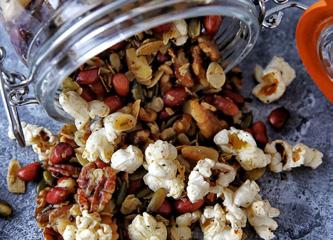
Don’t forget healthy cereals which make a great snack especially if paired with some fruit and milk or yoghurt - think popped rice, Shreddies, Shredded Wheat or Cheerios. And then there’s the fun favourite – popcorn! Try popping your own and experimenting with flavours (think cinnamon, smoked paprika, Marmite butter…)

Think of snacks as mini meals which should ideally include a small amount of foods from different food groups to ensure your kids stay fuller for longer. This will reduce the demand for more snacks!
Not always a firm favourite with kids but fruit can be offered in different ways to keep it interesting. Think fruit salad, fruit kebabs, chopped apple, banana and grapes, berries and natural yoghurt (you can use frozen berries to save some money and to offer them all year round).

Fruit smoothies are really tasty and go down well with kids, whilst home-made fruit muffins don’t even feel like fruit! See https://bit.ly/ktsmoothie for recipe.
Think oatcake with peanut butter or cheese, toasted fruit bread or even a fruity, low sugar flapjack - there’s a great recipe at https://bit.ly/ktflapjacks

You can also serve cheese with crackers or plain scones with cheese. Great for days when the kids really need to get their teeth into something….
Images, top row from left to right: celery sticks with peanut butter and raisins, savoury mix, fruit kebabs and natural yoghurt. Bottom row from left to right: courgette, spinach and cheese muffins, popcorn, fruity, low sugar flapjack.
Sarah Alder of Kitchen Titbits (www.kitchentitbits.co.uk) is a meal planning and family mealtimes mentor who works with parents to support fussy eaters. Visit her site for lots of tips and advice and to find out about her courses and workshops.
I have been a divorce lawyer for 23 years and during that time much has changed. The most important change for me is that my practice has evolved away from an adversarial approach, which could be accusatory and divisive, to an approach that is more solution focussed and aims to put the children at the centre. Wherever possible my Partner Kate and I try to support families through a more dignified divorce.

One thing that we have become acutely aware of is the use of language in our work; we know it matters. The words we use shape our mindsets, and affect how we think and behave. If the language of separation is the language of the battlefield we will end up with a war. We are really encouraged that the head of our family court commissioned a report reviewing language used by family law professionals, it really sums up our values. The Family Solutions Group review was published in October 2022 and will hopefully have a real and positive impact upon separating families.
The Hartlaw Family team is committed to promoting a problemsolving approach to all of our work. We are committed to remembering that your children are the children of two parents and not just our client. We are committed to supporting your whole family to find solutions.
We have always been mindful of the language we use about our client’s partner and their lawyer and we are committed to adopt the recommendations in our practice. We work hard to build good relationships with other family lawyers meaning we can have constructive conversations and problem solve together, which almost always lends itself to a better outcome for our clients.
The report focussing on encouraging lawyers, the judiciary and other professionals in their use of language but your language counts as well. Our top tips for use of language for separating couples:-
Refer to your partner by their name, not, “my ex”, “him”, “he who shall not be named” or any one of the eye watering expletives we have heard over the years.
When talking to your children about your co-parent call them mummy or mum as you always did – not “your mum” putting a distance between you and their other parent. Try to avoid criticism and using negative language, even if you think the children are not listening.
When talking about your separation with friends and family try to avoid battle language such as ‘Fighting for my rights’… ‘Custody battle’… ‘In my corner’… any words which use battle (or boxing ring) terminology will not help.
Instead talk about solving problems, fairness and working together - even if that feels like an impossible task at the moment – separation is hard, it hurts, but we can help you work through your separation and help you to build a positive future for the whole family.
For more information please contactDianne Burke on 01937 547003 email: dianne@hartlaw.co.uk or Kate Robinson on 01937 547037 email: kate@hartlaw.co.uk
rhs.org.uk/harlowcarr

‘My child is in the 99th percentile for reading but he is not able to tell me when he is hungry or thirsty.’
Traditionally, our mainstream education system tells us that a child is successful when they achieve at curriculum subjects such as reading and writing. We rarely associate academically bright children with learning difficulties or other cognitive issues, so these can often go overlooked in an academically achieving child.
These days, we are more aware of dyslexia and ADHD and how they can affect us but other more subtle difficulties can be difficult to understand. For example, I recently spoke to a parent of an 8-year-old boy who is a very fast learner and enjoys reading, of which his mother is, of course, very proud. However, he struggles a great deal with other things. Every week, there is a near accident in the toilet department; he doesn’t seem to know when he is hungry, cold or thirsty and his teachers report that he is socially aloof. So what could be going on here?

This is a problem with something called interoception and it can be worked on and improved by an experienced and qualified therapist.
What is interoception?
Interoception is better known as our body’s ability to understand messages from our internal organs. This includes the sense that we feel hungry or thirsty. Ignoring or not understanding these feelings can cause all sorts of problems. For example, not understanding when your bladder is full can lead to accidents.
As children grow, they learn to interpret the signals their bodies give them. However, sometimes interoception can be a difficult skill to acquire. Many children and even adults need help to develop this internal intelligence, which is distinct and separate from academic skills such as reading and writing. It is not uncommon for internal intelligence and academic skills to be out of synch.
Developing mindfulness can be very beneficial to us all in understanding how our interoception works. It can be a topdown way to deliver awareness and improve our understanding of our bodies. Giving ourselves the ability to better understand our body’s signals naturally leads to better interoception.

Interoception is part of something larger called neuroception, which is our response to all sensory triggers, both internal and external. As it includes our body’s signals and those around us, such as different sensations and noises, it plays a huge part in how we understand if we are safe or not. For example, neuroception is responsible for how we interpret the tones of others’ voices: whether they seem gentle and friendly, or angry and threatening.
Of course, these skills don’t just affect us physically, they also affect how we interpret our emotional state and how we decide to act on our emotions. If we can’t understand our own emotions, we can’t understand those of others either. This leads to awkward social interaction, which is where that sense of aloofness from a person with poor neuroception often comes from, as well as their apparent lack of empathy.
Not feeling safe because we don’t understand how to read the environment and those around us can lead to a poor sense of self and be linked to mental health problems. It’s fortunate that there are ways to help children with this issue.
Usha Patel is a neurocognitive therapist who runs Raviv Practice London (www.ravivpracticelondon.co.uk).
Follow
This idea of feeling safe is so important and there is a fantastic therapy called the Safe and Sound Protocol which can help a great deal.

By using algorithmically filtered music, this therapy allows the individual’s nervous system to understand and communicate with processes within the body. The ability to tune in to your bodily needs and to appear more connected to others, happens over a period of time and has produced some remarkable results. Read more at www.move2connect.com.
Here is a simple exercise your child can try at home. Sit in a favourite chair with both feet flat on the floor. Have one hand on the navel and the other on the chest. Be still in this position for ten to twenty seconds.
Experience the rise and fall of the tummy and the beating of the heart. Ignore the outside world and enjoy this moment. This is easy to say but not always easy to do. Practice makes perfect!

Have you ever wondered why keeping healthy is so tough for some of us but seems easy for others? And why the so-called ‘non-communicable’ diseases like cardiovascular disease and diabetes still account for most deaths around the world, despite all the efforts of doctors and health care systems? Did you know that unconscious communication with your baby in the womb helps their body’s control systems develop for lifelong health?
An increasing number of medical experts would say that we are missing a fundamental clue to what makes us healthy. Our lifelong risk of chronic diseases can be established during our first thousand days, from conception until age two. This critical time affects how our bodies are put together and how we will respond to the world we will live in, with its stresses, need for exercise and good diet, adequate sleep and healthy behaviours.
The secrets of the first thousand days of our lives start from the moment of conception. Once the egg and sperm have fused, the very early embryo begins ‘tasting’ its environment. It detects signals about the world from the mother’s hormones and the nutrients from the food she eats. These leave small ‘epigenic’ marks on the embryo’s DNA. It’s not just about the mother; the father’s sperm brings the egg its own marks too, affected by his diet and lifestyle. These change the instructions given by the inherited genes and can change how the unborn baby develops.
As the foetus grows it senses more signals from the mother’s lifestyle and nutrition. This is important because some organs developed before birth must serve us for a lifetime, like the muscle cells in our hearts and the filtering units in our kidneys. We even started practising breathing, albeit underwater, inside the womb and our lungs are sensitive to cues from our mother. Scientific advances reveal even more surprises; for example, that foetal brain electrical activity looks like adult sleep states. Could the foetus even be dreaming?
Children continue to respond to care and signals from the environment as they achieve major milestones before the age of 2, such as eating solid food, speaking their first words and taking first steps unaided. Some developments are less visible, like colonisation of the gut with bacteria, building an immune system based on ‘experience,’ or the changes in nerve cells and connections within the brain as they learn to recognise new faces and voices.
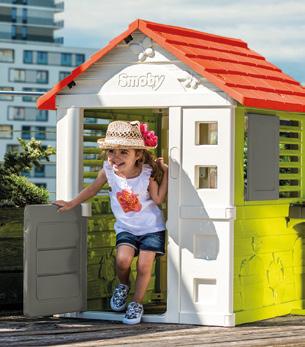

FEAST brings the fun to the school holidays, offering loads of different activities for everyone to take part in. All children and young people across North Yorkshire can get involved in a range of sessions, with free places and a free lunch for those on benefits-related Free School Meals, thanks to funding from the Department for Education.
To see all the fantastic activities on offer and learn more about how to claim a free place, visit the FEAST website https://bit. ly/FEASTFamiliesNY

We are quite used to checking our children’s growth from the moment of birth. It is particularly important because poor foetal growth is associated with greater risk of non-communicable diseases later in life and small babies sometimes struggle to thrive. In addition, more young people than ever are overweight or obese and this risk of poor overall health can pass across generations too.
Knowing the secrets of development and how they can affect risks of ill-health later in life makes us think: if all parents were better prepared before pregnancy they would give the best first thousand days to the next generation. Our children won’t remember it or grow up to thank us but they’ll stay healthier.
Mark and Lucy, both at the University of Southampton, have spent decades researching the processes underlying human early development, which are now published in their new book What Makes a Person: Secrets of Our First 1,000 Days, available from www.bookshop.org.

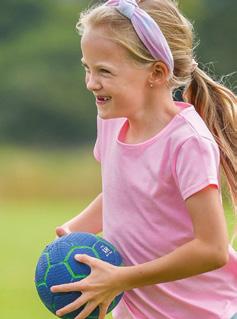

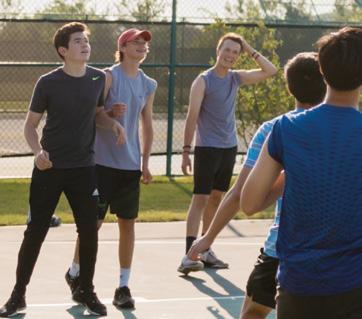
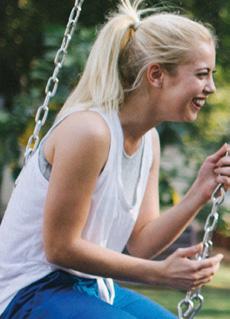
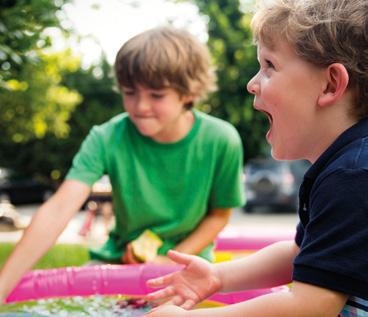
children
